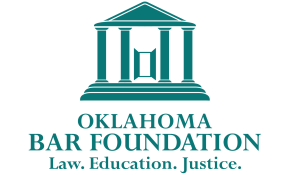Oklahoma Bar Journal
Bar Foundation News | OBF: Advocating for Oklahoma's Most Vulnerable Youth
By Renee DeMoss
 Children navigating abuse, neglect or instability often have little opportunity to ensure their voices are heard in legal proceedings. The Oklahoma Bar Foundation recognizes this profound gap and directs significant grant support to organizations that fill this role. Whether it is a volunteer advocate speaking for a child in court or a child advocacy center providing safety and healing, OBF funding ensures that children in crisis are not alone.
Children navigating abuse, neglect or instability often have little opportunity to ensure their voices are heard in legal proceedings. The Oklahoma Bar Foundation recognizes this profound gap and directs significant grant support to organizations that fill this role. Whether it is a volunteer advocate speaking for a child in court or a child advocacy center providing safety and healing, OBF funding ensures that children in crisis are not alone.
Across Oklahoma, multiple life-changing grantees focus on providing children with legal representation, care and stability during their most challenging moments. Their work is an essential extension of the legal system, providing services and insights that would otherwise go unheard.
CANADIAN COUNTY CASA: ADVOCACY IN THE COURTROOM
CASA programs across the state recruit and train volunteers to speak for children involved in the foster care system. Canadian County CASA, supported by the OBF, ensures that children who have been removed from their homes due to abuse or neglect have someone focused solely on their best interests. Volunteers meet regularly with children, attend school conferences and provide judges with fact-based recommendations that inform life-altering decisions about safety, placement and permanency.
The Canadian County CASA team emphasizes that OBF funding sustains training and supervision for these advocates, equipping them to provide consistent support. Judges rely on CASA reports because they reflect the child’s voice directly, which is an element that might otherwise be missing in the legal process.
THE CARE CENTER: A SAFE PLACE TO SPEAK
In Oklahoma County, The CARE Center provides a safe environment for children who must disclose their stories for use in legal proceedings. Forensic interview specialists, supported in part by OBF funding, meet with children in a child-friendly environment designed to reduce fear and trauma. These interviews are structured so that children tell their stories once, eliminating the need to relive painful experiences in multiple settings.
The CARE Center also offers therapy and connects families with resources that promote long-term healing and recovery. By funding this work, the OBF ensures that children have a voice in legal investigations and receive the comprehensive care they need to move forward.
A BROADER COMMITMENT
The OBF is honored to support many child-focused organizations from a legal standpoint. From Marie Detty Youth and Family Services to the Mary Abbott Children’s House and from the Guardian Ad Litem Institute to Oklahoma Lawyers for Children, these programs reach across urban and rural communities to serve children at risk of abuse, neglect and system disenfranchisement. Together, they create a network of advocates and professionals who act swiftly and compassionately to protect children and uphold justice.
From the courtroom to the counseling room, OBF-funded programs provide children in crisis with the opportunity to be seen, heard and protected. By supporting these organizations, the OBF helps ensure that the promise of justice in Oklahoma extends to its youngest and most vulnerable residents.
THE STRATEGIC CONNECTION
Findings from the 2024-2025 OBF Legal Needs Survey reinforce the importance of child advocacy programs:
- 47% of responding attorneys statewide identified family law matters as an unmet legal need.
- One of the most significant barriers is the lack of affordable legal services. 47% of respondents said this is a high barrier. These financial/legal access obstacles disproportionately affect families and children in crisis.
- 50% of respondents believe adults and youth are not very aware of their legal rights and responsibilities.
Access the full survey report at www.okbarfoundation.org/legal-needs-report.
Ms. DeMoss is the executive director of the Oklahoma Bar Foundation.
Originally published in the Oklahoma Bar Journal – OBJ 96 No. 9 (November 2025)
Statements or opinions expressed in the Oklahoma Bar Journal are those of the authors and do not necessarily reflect those of the Oklahoma Bar Association, its officers, Board of Governors, Board of Editors or staff.
